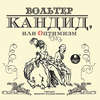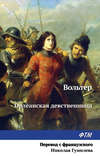Читать книгу: «A Philosophical Dictionary, Volume 04», страница 5
DEMONIACS
Hypochondriacal and epileptic persons, and women laboring under hysterical affections, have always been considered the victims of evil spirits, malignant demons and divine vengeance. We have seen that this disease was called the sacred disease; and that while the physicians were ignorant, the priests of antiquity obtained everywhere the care and management of such diseases.
When the symptoms were very complicated, the patient was supposed to be possessed with many demons – a demon of madness, one of luxury, one of avarice, one of obstinacy, one of short-sightedness, one of deafness; and the exorciser could not easily miss finding a demon of foolery created, with another of knavery.
The Jews expelled devils from the bodies of the possessed, by the application of the root barath, and a certain formula of words; our Saviour expelled them by a divine virtue; he communicated that virtue to his apostles, but it is now greatly impaired.
A short time since, an attempt was made to renew the history of St. Paulin. That saint saw on the roof of a church a poor demoniac, who walked under, or rather upon, this roof or ceiling, with his head below and his feet above, nearly in the manner of a fly. St. Paulin clearly perceived that the man was possessed, and sent several leagues off for some relics of St. Felix of Nola, which were applied to the patient as blisters. The demon who supported the man against the roof instantly fled, and the demoniac fell down upon the pavement.
We may have doubts about this history, while we preserve the most profound respect for genuine miracles; and we may be permitted to observe that this is not the way in which we now cure demoniacs. We bleed them, bathe them, and gently relax them by medicine; we apply emollients to them. This is M. Pome's treatment of them; and he has performed more cures than the priests of Isis or Diana, or of anyone else who ever wrought by miracles. As to demoniacs who say they are possessed merely to gain money, instead of being bathed, they are at present flogged.
It often happened, that the specific gravity of epileptics, whose fibres and muscles withered away, was lighter than water, and that they floated when put into it. A miracle! was instantly exclaimed. It was pronounced that such a person must be a demoniac or sorcerer; and holy water or the executioner was immediately sent for. It was an unquestionable proof that either the demon had become master of the body of the floating person, or that the latter had voluntarily delivered himself over to the demon. On the first supposition the person was exorcised, on the second he was burned. Thus have we been reasoning and acting for a period of fifteen or sixteen hundred years, and yet we have the effrontery to laugh at the Kaffirs.
In 1603, in a small village of Franche-Comté, a woman of quality made her granddaughter read aloud the lives of the saints in the presence of her parents; this young woman, who was, in some respects, very well informed, but ignorant of orthography, substituted the word histories for that of lives (vies). Her step-mother, who hated her, said to her in a tone of harshness, "Why don't you read as it is there?" The girl blushed and trembled, but did not venture to say anything; she wished to avoid disclosing which of her companions had interpreted the word upon a false orthography, and prevented her using it. A monk, who was the family confessor, pretended that the devil had taught her the word. The girl chose to be silent rather than vindicate herself; her silence was considered as amounting to confession; the Inquisition convicted her of having made a compact with the devil: she was condemned to be burned, because she had a large fortune from her mother, and the confiscated property went by law to the inquisitors. She was the hundred thousandth victim of the doctrine of demoniacs, persons possessed by devils and exorcisms, and of the real devils who swayed the world.
DESTINY
Of all the books written in the western climes of the world, which have reached our times, Homer is the most ancient. In his works we find the manners of profane antiquity, coarse heroes, and material gods, made after the image of man, but mixed up with reveries and absurdities; we also find the seeds of philosophy, and more particularly the idea of destiny, or necessity, who is the dominatrix of the gods, as the gods are of the world.
When the magnanimous Hector determines to fight the magnanimous Achilles, and runs away with all possible speed, making the circuit of the city three times, in order to increase his vigor; when Homer compares the light-footed Achilles, who pursues him, to a man that is asleep! and when Madame Dacier breaks into a rapture of admiration at the art and meaning exhibited in this passage, it is precisely then that Jupiter, desirous of saving the great Hector who has offered up to him so many sacrifices, bethinks him of consulting the destinies, upon weighing the fates of Hector and Achilles in a balance. He finds that the Trojan must inevitably be killed by the Greek, and is not only unable to oppose it, but from that moment Apollo, the guardian genius of Hector, is compelled to abandon him. It is not to be denied that Homer is frequently extravagant, and even on this very occasion displays a contradictory flow of ideas, according to the privilege of antiquity; but yet he is the first in whom we meet with the notion of destiny. It may be concluded, then, that in his days it was a prevalent one.
The Pharisees, among the small nation of Jews, did not adopt the idea of a destiny till many ages after. For these Pharisees themselves, who were the most learned class among the Jews, were but of very recent date. They mixed up, in Alexandria, a portion of the dogmas of the Stoics with their ancient Jewish ideas. St. Jerome goes so far as to state that their sect is but a little anterior to our vulgar era.
Philosophers would never have required the aid of Homer, or of the Pharisees, to be convinced that everything is performed according to immutable laws, that everything is ordained, that everything is, in fact, necessary. The manner in which they reason is as follows:
Either the world subsists by its own nature, by its own physical laws, or a Supreme Being has formed it according to His supreme laws: in both cases these laws are immovable; in both cases everything is necessary; heavy bodies tend towards the centre of the earth without having any power or tendency to rest in the air. Pear-trees cannot produce pine-apples. The instinct of a spaniel cannot be the instinct of an ostrich; everything is arranged, adjusted, and fixed.
Man can have only a certain number of teeth, hairs, and ideas; and a period arrives when he necessarily loses his teeth, hair, and ideas.
It is contradictory to say that yesterday should not have been; or that to-day does not exist; it is just as contradictory to assert that that which is to come will not inevitably be.
Could you derange the destiny of a single fly there would be no possible reason why you should not control the destiny of all other flies, of all other animals, of all men, of all nature. You would find, in fact, that you were more powerful than God.
Weak-minded persons say: "My physician has brought my aunt safely through a mortal disease; he has added ten years to my aunt's life." Others of more judgment say, the prudent man makes his own destiny.
Nullum numen abest, si sit Prudentia, sed te
Nos facimus, Fortuna, deam cœoque locamus.
– JUVENAL, Sat. x. v. 365.
We call on Fortune, and her aid implore,
While Prudence is the goddess to adore.
But frequently the prudent man succumbs under his destiny instead of making it; it is destiny which makes men prudent. Profound politicians assure us that if Cromwell, Ludlow, Ireton, and a dozen other parliamentary leaders, had been assassinated eight days before Charles I. had his head cut off, that king would have continued alive and have died in his bed; they are right; and they may add, that if all England had been swallowed up in the sea, that king would not have perished on a scaffold before Whitehall. But things were so arranged that Charles was to have his head cut off.
Cardinal d'Ossat was unquestionably more clever than an idiot of the petites maisons; but is it not evident that the organs of the wise d'Ossat were differently formed than those of that idiot? – Just as the organs of a fox are different from those of a crane or a lark.
Your physician saved your aunt, but in so doing he certainly did not contradict the order of nature, but followed it. It is clear that your aunt could not prevent her birth in a certain place, that she could not help being affected by a certain malady, at a certain time; that the physician could be in no other place than where he was, that your aunt could not but apply to him, that he could not but prescribe medicines which cured her, or were thought to cure her, while nature was the sole physician.
A peasant thinks that it hailed upon his field by chance; but the philosopher knows that there was no chance, and that it was absolutely impossible, according to the constitution of the world, for it not to have hailed at that very time and place.
There are some who, being shocked by this truth, concede only half of it, like debtors who offer one moiety of their property to their creditors, and ask remission for the other. There are, they say, some events which are necessary, and others which are not so. It would be curious for one part of the world to be changed and the other not; that one part of what happens should happen inevitably, and another fortuitously. When we examine the question closely, we see that the doctrine opposed to that of destiny is absurd; but many men are destined to be bad reasoners, others not to reason at all, and others to persecute those who reason well or ill.
Some caution us by saying, "Do not believe in fatalism, for, if you do, everything appearing to you unavoidable, you will exert yourself for nothing; you will sink down in indifference; you will regard neither wealth, nor honors, nor praise; you will be careless about acquiring anything whatever; you will consider yourself meritless and powerless; no talent will be cultivated, and all will be overwhelmed in apathy."
Do not be afraid, gentlemen; we shall always have passions and prejudices, since it is our destiny to be subjected to prejudices and passions. We shall very well know that it no more depends upon us to have great merit or superior talents than to have a fine head of hair, or a beautiful hand; we shall be convinced that we ought to be vain of nothing, and yet vain we shall always be.
I have necessarily the passion for writing as I now do; and, as for you, you have the passion for censuring me; we are both equally fools, both equally the sport of destiny. Your nature is to do ill, mine is to love truth, and publish it in spite of you.
The owl, while supping upon mice in his ruined tower, said to the nightingale, "Stop your singing there in your beautiful arbor, and come to my hole that I may eat you." The nightingale replied, "I am born to sing where I am, and to laugh at you."
You ask me what is to become of liberty: I do not understand you; I do not know what the liberty you speak of really is. You have been so long disputing about the nature of it that you do not understand it. If you are willing, or rather, if you are able to examine with me coolly what it is, turn to the letter L.
DEVOTEE
The word devout (dévot) signifies devoted (dévoué), and, in the strict sense of the term, can only be applicable to monks, and to females belonging to some religious order and under vows. But as the gospel makes no mention of vows or devotees, the title should not, in fact, be given to any person: the whole world ought to be equally just. A man who calls himself devout is like a plebeian who calls himself a marquis; he arrogates a quality which does not belong to him; he thinks himself a better man than his neighbor. We pardon this folly in women; their weakness and frivolity render them excusable; they pass, poor things, from a lover to a spiritual director with perfect sincerity, but we cannot pardon the knaves who direct them, who abuse their ignorance, and establish the throne of their pride on the credulity of the sex. They form a snug mystical harem, composed of seven or eight elderly beauties subjugated by the weight of inoccupation, and almost all these subjects pay tribute to their new master. No young women without lovers; no elderly devotee without a director. – Oh, how much more shrewd are the Orientals than we! A pasha never says, "We supped last night with the aga of the janissaries, who is my sister's lover; and with the vicar of the mosque, who is my wife's director."
DIAL
Dial of Ahaz
It is well known that everything is miraculous in the history of the Jews; the miracle performed in favor of King Hezekiah on the dial of Ahaz is one of the greatest that ever took place: it is evident that the whole earth must have been deranged, the course of the stars changed forever, and the periods of the eclipses of the sun and moon so altered as to confuse all the ephemerides. This was the second time the prodigy happened. Joshua had stopped the sun at noon on Gibeon, and the moon on Ascalon, in order to get time to kill a troop of Amorites already crushed by a shower of stones from heaven.
The sun, instead of stopping for King Hezekiah, went back, which is nearly the same thing, only differently described.
In the first place Isaiah said to Hezekiah, who was sick, "Thus saith the Lord, set thine house in order; for thou shalt die and not live."
Hezekiah wept and God was softened; He signified to him, through Isaiah, that he should still live fifteen years, and that in three days he should go to the temple; then Isaiah brought a plaster of figs and put it on the king's ulcers, and he was cured – "et curatus est."
Hezekiah demanded a sign to convince him that he should be cured. Isaiah said to him, "Shall the shadow go forward ten degrees, or go back ten degrees?" And Hezekiah answered, "It is a light thing for the shadow to go down ten degrees; let the shadow return backward ten degrees." And Isaiah the prophet cried unto the Lord, and He brought the shadow ten degrees backwards from the point to which it had gone down on the dial of Ahaz.
We should like to know what this dial of Ahaz was; whether it was the work of a dialmaker named Ahaz, or whether it was a present made to a king of that name, it is an object of curiosity. There have been many disputes on this dial; the learned have proved that the Jews never knew either clocks or dials before their captivity in Babylon – the only time, say they, in which they learned anything of the Chaldæans, or the greater part of the nation began to read or write. It is even known that in their language they had no words to express clock, dial, geometry, or astronomy; and in the Book of Kings the dial of Ahaz is called the hour of the stone.
But the grand question is to know how King Hezekiah, the possessor of this clock, or dial of the sun – this hour of stone – could tell that it was easy to advance the sun ten degrees. It is certainly as difficult to make it advance against its ordinary motion as to make it go backward.
The proposition of the prophet appears as astonishing as the discourse of the king: Shall the shadow go forward ten degrees, or go back ten degrees? That would have been well said in some town of Lapland, where the longest day of the year is twenty hours; but at Jerusalem, where the longest day of the year is about fourteen hours and a half, ii was absurd. The king and the prophet deceived each other grossly. We do not deny the miracle, we firmly believe it; we only remark that Hezekiah and Isaiah knew not what they said. Whatever the hour, it was a thing equally impossible to make the shadow of the dial advance or recede ten hours. If it were two hours after noon, the prophet could, no doubt, have very well made the shadow of the dial go back to four o'clock in the morning; but in this case he could not have advanced it ten hours, since then it would have been midnight, and at that time it is not usual to have a shadow of the sun in perfection.
It is difficult to discover when this strange history was written, but perhaps it was towards the time in which the Jews only confusedly knew that there were clocks and sun-dials. In that case it is true that they got but a very imperfect knowledge of these sciences until they went to Babylon. There is a still greater difficulty of which the commentators have not thought; which is that the Jews did not count by hours as we do.
The same miracle happened in Greece, the day that Atreus served up the children of Thyestes for their father's supper.
The same miracle was still more sensibly performed at the time of Jupiter's intrigue with Alcmena. It required a night double the natural length to form Hercules. These adventures are common in antiquity, but very rare in our days, in which all things have degenerated.
DICTIONARY
The invention of dictionaries, which was unknown to antiquity, is of the most unquestionable utility; and the "Encyclopædia," which was suggested by Messrs. d'Alembert and Diderot, and so successfully completed by them and their associates, notwithstanding all its defects, is a decisive evidence of it. What we find there under the article "Dictionary" would be a sufficient instance; it is done by the hand of a master.
I mean to speak here only of a new species of historical dictionaries, which contain a series of lies and satires in alphabetical order; such is the "Historical Literary and Critical Dictionary," containing a summary of the lives of celebrated men of every description, and printed in 1758, in six volumes, octavo, without the name of the author.
The compilers of that work begin with declaring that it was undertaken by the advice of the author of the "Ecclesiastical Gazette," "a formidable writer," they add, "whose arrow," which had already been compared to that of Jonathan, "never returned back, and was always steeped in the blood of the slain, in the carnage of the valiant." – "A sanguine interfectorum ab adipe fortium sagitta Jonathæ nunquam abiit retrorsum."
It will, no doubt, be easily admitted that the connection between Jonathan, the son of Saul, who was killed at the battle of Gilboa, and a Parisian convulsionary, who scribbles ecclesiastical notices in his garret, in 1758, is wonderfully striking.
The author of this preface speaks in it of the great Colbert. We should conceive, at first, that the great statesman who conferred such vast benefits on France is alluded to; no such thing, it is a bishop of Montpellier. He complains that no other dictionary has bestowed sufficient praise on the celebrated Abbé d'Asfeld, the illustrious Boursier, the famous Genes, the immortal Laborde, and that the lash of invective on the other hand has not been sufficiently applied to Languet, archbishop of Sens, and a person of the name of Fillot, all, as he pretends, men well known from the Pillars of Hercules to the frozen ocean. He engages to be "animated, energetic, and sarcastic, on a principle of religion"; that he will make his countenance "sterner than that of his enemies, and his front harder than their front, according to the words of Ezekiel," etc.
He declares that he has put in contribution all the journals and all the anas; and he concludes with hoping that heaven will bestow a blessing on his labors.
In dictionaries of this description, which are merely party works, we rarely find what we are in quest of, and often what we are not. Under the word "Adonis," for example, we learn that Venus fell in love with him; but not a word about the worship of Adonis, or Adonai among the Phœnicians – nothing about those very ancient and celebrated festivals, those lamentations succeeded by rejoicings, which were manifest allegories, like the feasts of Ceres, of Isis, and all the mysteries of antiquity.
But, in compensation, we find Adkichomia a devotee, who translated David's psalms in the sixteenth century; and Adkichomus, apparently her relation, who wrote the life of Jesus Christ in low German.
We may well suppose that all the individuals of the faction which employed this person are loaded with praise, and their enemies with abuse. The author, of the crew of authors who have put together this vocabulary of trash, say of Nicholas Boindin, attorney-general of the treasures of France, and a member of the Academy of Belles-lettres, that he was a poet and an atheist.
That magistrate, however, never printed any verses, and never wrote anything on metaphysics or religion.
He adds that Boindin will be ranked by posterity among the Vaninis, the Spinozas, and the Hobbeses. He is ignorant that Hobbes never professed atheism – that he merely subjected religion to the sovereign power, which he denominates the Leviathan. He is ignorant that Vanini was not an atheist; that the term "atheist" is not to be found even in the decree which condemned him; and that he was accused of impiety for having strenuously opposed the philosophy of Aristotle, and for having disputed with indiscretion and acrimony against a counsellor of the parliament of Toulouse, called Francon, or Franconi, who had the credit of getting him burned to death; for the latter burn whom they please; witness the Maid of Orleans, Michael Servetus, the Counsellor Dubourg, the wife of Marshal d'Ancre, Urbain Grandier, Morin, and the books of the Jansenists. See, moreover, the apology for Vanini by the learned Lacroze, and the article on "Atheism."
The vocabulary treats Boindin as a miscreant; his relations were desirous of proceeding at law and punishing an author, who himself so well deserved the appellation which he so infamously applied to a man who was not merely a magistrate, but also learned and estimable; but the calumniator concealed himself, like most libellers, under a fictitious name.
Immediately after having applied such shameful language to a man respectable compared with himself, he considers him as an irrefragable witness, because Boindin – whose unhappy temper was well known – left an ill-written and exceedingly ill-advised memorial, in which he accuses La Motte – one of the worthiest men in the world, a geometrician, and an ironmonger – with having written the infamous verses for which Jean Baptiste Rousseau was convicted. Finally, in the list of Boindin's works, he altogether omits his excellent dissertations printed in the collection of the Academy of Belles-lettres, of which he was a highly distinguished member.
The article on "Fontenelle" is nothing but a satire upon that ingenious and learned academician, whose science and talents are esteemed by the whole of literary Europe. The author has the effrontery to say that "his 'History of Oracles' does no honor to his religion." If Van Dale, the author of the "History of Oracles," and his abridger, Fontenelle, had lived in the time of the Greeks and of the Roman republic, it might have been said with reason that they were rather good philosophers than good pagans; but, to speak sincerely, what injury do they do to Christianity by showing that the pagan priests were a set of knaves? Is it not evident that the authors of the libel, miscalled a dictionary, are pleading their own cause? "Jam proximus ardet Ucalegon" But would it be offering an insult to the Christian religion to prove the knavery of the Convulsionaries? Government has done more; it has punished them without being accused of irreligion.
The libeller adds that he suspects that Fontenelle never performed the duties of a Christian but out of contempt for Christianity itself. It is a strange species of madness on the part of these fanatics to be always proclaiming that a philosopher cannot be a Christian. They ought to be excommunicated and punished for this alone; for assuredly it implies a wish to destroy Christianity to assert that it is impossible for a man to be a good reasoner and at the same time believe a religion so reasonable and holy.
Des Yveteaux, preceptor of Louis XIV., is accused of having lived and died without religion. It seems as if these compilers had none; or at least as if, while violating all the precepts of the true one, they were searching about everywhere for accomplices.
The very gentlemanly writer of these articles is wonderfully pleased with exhibiting all the bad verses that have been written on the French Academy, and various anecdotes as ridiculous as they are false. This also is apparently out of zeal for religion.
I ought not to lose an opportunity of refuting an absurd story which has been much circulated, and which is repeated exceedingly malapropos under the article of the "Abbé Gedoyn," upon whom the writer falls foul with great satisfaction, because in his youth he had been a Jesuit; a transient weakness, of which I know he repented all his life.
The devout and scandalous compiler of the dictionary asserts that the Abbé Gedoyn slept with the celebrated Ninon de l'Enclos on the very night of her completing her eightieth year. It certainly was not exactly befitting in a priest to relate this anecdote in a pretended dictionary of illustrious men. Such a foolery, however, is in fact highly improbable; and I can take upon me to assert that nothing can be more false. The same anecdote was formerly put down to the credit of the Abbé Chateauneuf, who was not very difficult in his amours, and who, it was said, had received Ninon's favors when she was of the age of sixty, or, rather, had conferred upon her his own. In early life I saw a great deal of the Abbé Gedoyn, the Abbé Chateauneuf, and Mademoiselle de l'Enclos; and I can truly declare that at the age of eighty years her countenance bore the most hideous marks of old age – that her person was afflicted with all the infirmities belonging to that stage of life, and that her mind was under the influence of the maxims of an austere philosophy.
Under the article on "Deshoulières" the compiler pretends that lady was the same who was designated under the term prude (précieuse) in Boileau's satire upon women. Never was any woman more free from such weakness than Madame Deshoulières; she always passed for a woman of the best society, possessed great simplicity, and was highly agreeable in conversation.
The article on "La Motte" abounds with atrocious abuse of that academician, who was a man of very amiable manners, and a philosophic poet who produced excellent works of every description. Finally the author, in order to secure the sale of his book of six volumes, has made of it a slanderous libel.
His hero is Carré de Montgeron, who presented to the king a collection of the miracles performed by the Convulsionaries in the cemetery of St. Médard; who became mad and died insane.
The interest of the republic of literature and reason demands that those libellers should be delivered up to public indignation, lest their example, operating upon the sordid love of gain, should stimulate others to imitation; and the more so, as nothing is so easy as to copy books in alphabetical order, and add to them insipidities, calumnies, and abuse.
Extract from the Reflections of an Academician on the "Dictionary of the French Academy."
It would be desirable to state the natural and incontestable etymology of every word, to compare the application, the various significations, the extent of the word, with use of it; the different acceptations, the strength or weakness of correspondent terms in foreign languages; and finally, to quote the best authors who have used the word, to show the greater or less extent of meaning which they have given to it and to remark whether it is more fit for poetry than prose.
For example, I have observed that the "inclemency" of the weather is ridiculous in history, because that term has its origin in the anger of heaven, which is supposed to be manifested by the intemperateness, irregularities, and rigors of the seasons, by the violence of the cold, the disorder of the atmosphere, by tempests, storms, and pestilential exhalations. Thus then inclemency, being a metaphor, is consecrated to poetry.
I have given to the word "impotence" all the acceptations which it receives. I showed the correctness of the historian, who speaks of the impotence of King Alphonso, without explaining whether he referred to that of resisting his brother, or that with which he was charged by his wife.
I have endeavored to show that the epithets "irresistible" and "incurable" require very delicate management. The first who used the expression, "the irresistible impulse of genius," made a very fortunate hit; because, in fact, the question was in relation to a great genius throwing itself upon its own resources in spite of all difficulties. Those imitators who have employed the expression in reference to very inferior men are plagiarists who know not how to dispose of what they steal.
As soon as the man of genius has made a new application of any word in the language, copyists are not wanting to apply it, very malapropos, in twenty places, without giving the inventor any credit.
I do not know that a single one of these words, termed by Boileau "foundlings" (des mots trouvés) a single new expression of genius, is to be found in any tragic author since Racine, until within the last few years. These words are generally lax, ineffective, stale, and so ill placed as to produce a barbarous style. To the disgrace of the nation, these Visigothic and Vandal productions were for a certain time extolled, panegyrized, and admired in the journals, especially as they came out under the protection of a certain lady of distinction, who knew nothing at all about the subject. We have recovered from all this now; and, with one or two exceptions, the whole race of such productions is extinct forever.





















